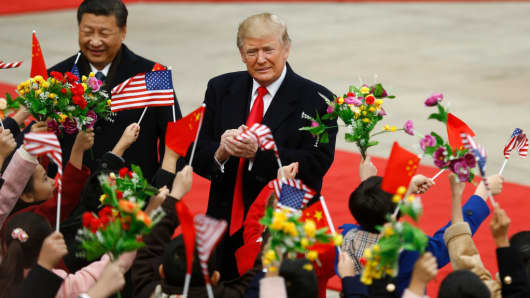
President Donald Trump received a ringing endorsement this week from an unexpected source: A highly nationalistic Chinese propaganda outlet.
In a Thursday editorial, China’s Global Times praised many of the U.S. leader’s qualities, and criticized the American media for “fake reports” that painted a negative picture of the man.
“Trump is one of the most popular heads of state on the Chinese Internet, and generally the Chinese public holds a positive attitude toward him,” wrote the Global Times, a Communist Party-owned newspaper.
China is this week engaged in an all-out charm offensive to try to butter Trump up for any negotiations he may have with Xi. The U.S. leader arrived in the country on Wednesday.
The Chinese “have figured out, as many other countries have realized, that the way to win over President Trump and get him to back off some of his more hostile campaign rhetoric is to turn up the charm,” Aaron Connelly, research fellow at the Lowy Institute for International Policy, told CNBC earlier in the week.
The dig at the U.S. media is particularly noteworthy because Trump has frequently criticized the press, which he has derided as biased and purveyors of “fake news.” The propaganda outlet’s mirroring of his terminology, therefore, is unlikely to be a coincidence.
In its editorial, the Global Times wrote that the supposed high opinion of Trump in China “doesn’t come easily, as the initial impression of Trump was completely led by U.S. media reports.
“These absurd reports deeply influenced Chinese public opinion. It wasn’t until his election victory that the Chinese public realized they had been cheated by the American media,” it added.
Despite that flattery, the Chinese press has routinely criticized Trump — sometimes sharply — over differences in issues like Taiwan and North Korea.
In December, Global Times called Trump “ignorant like a child” in handling diplomacy after the then president-elect stated that the U.S. did not necessarily have to stick to the “One China” policy.
In April, state news agency Xinhua criticized the U.S. for its strike in Syria, calling it the actions of a weak politician who was attempting to flex his muscles.
In August this year, Xinhua rebuked the U.S. president for his “emotional venting” on Twitter after he criticized China for not reining North Korea in.
Nevertheless, the Global Times posited that: “Many leading U.S. media outlets are now discredited among the Chinese public, partly because of their fake reports during the elections and subjective opposition against Trump.”
It did not cite any specific reports that it believed were fake.
On Thursday, Trump’s visit to China was a top trending topic on the country’s microblog platform Weibo, where news about the U.S. leader’s visit was greeted with a Chinese-language hashtag translating to “#Trumpishere.”
Reactions to Trump’s visit were generally warm in a country where the brash style of the U.S. leader is perceived to be fresh and free-spirited.
The Global Times put it this way: “Chinese appreciate his directness, which is in sharp contrast to [2016 presidential rival] Hillary Clinton, who always puts on airs. This has won him popularity since the election campaign. Many feel he may stick to his own ideas, but he is not insidious.”
Trump’s granddaughter’s recital of Chinese poetry and her latest rendition of a Chinese song to the Xis have also charmed the Chinese public.
Global Times also gave bonus points to Trump for seeming to be “pragmatic” on his Beijing policy so far with “no interest in ideological diplomacy.”
“He hasn’t used the issue of human rights to make trouble for China so far, and this means the Sino-U.S. relationship can focus on substantive matters,” it added.
Source:-CNBC
